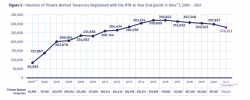Brendan Burgess
Founder
- Messages
- 52,116
The only commentary I have heard is of landlords exiting the market.
But surely there are others getting into the market or increasing their holdings.
Any data on this or any discussion which I have missed?
There is a big net exit to be sure, but is it really 43,000 ?
Brendan
But surely there are others getting into the market or increasing their holdings.
Any data on this or any discussion which I have missed?
There is a big net exit to be sure, but is it really 43,000 ?
Brendan


:quality(70)/cloudfront-eu-central-1.images.arcpublishing.com/irishtimes/M3XZZQXUHJDWDCZQQ36YIBYWXU.jpg)